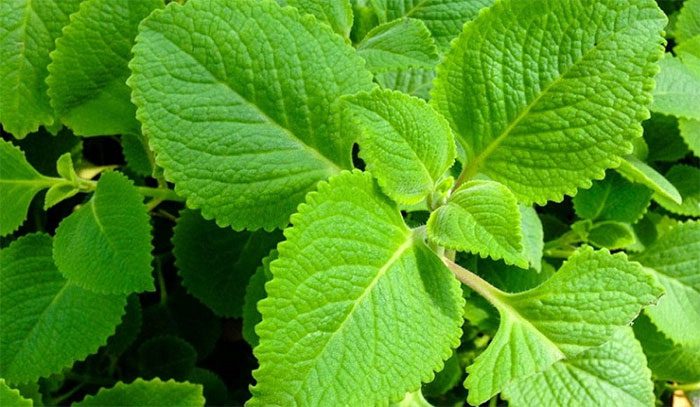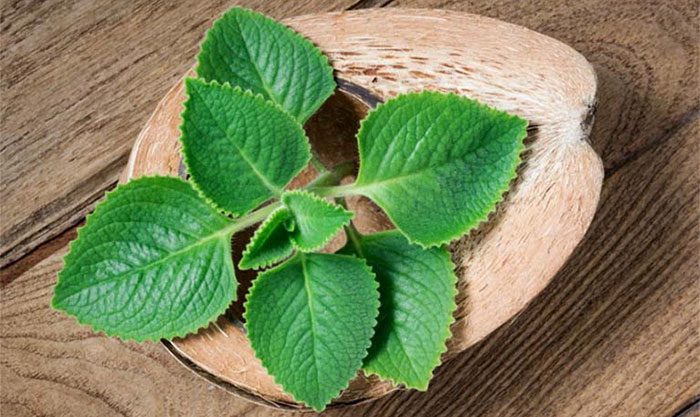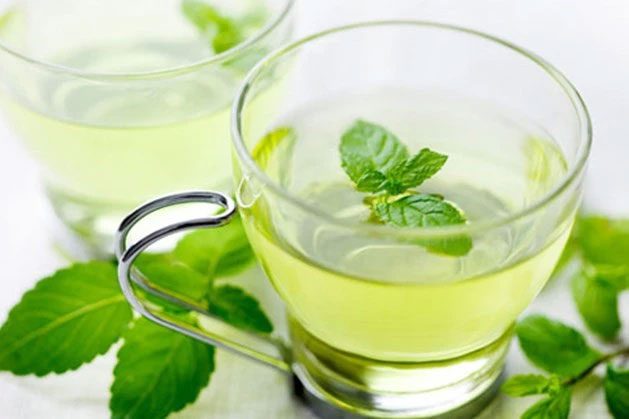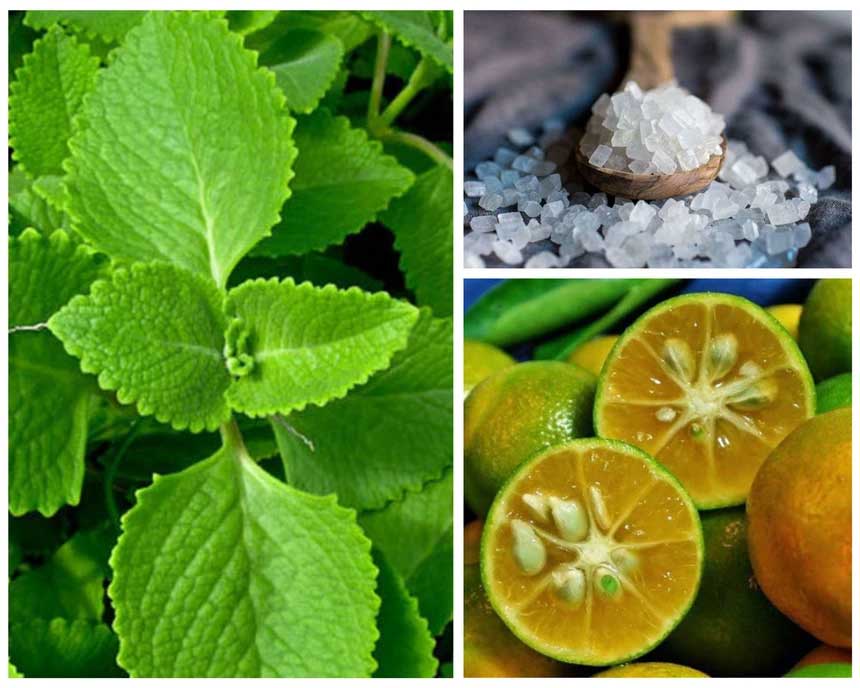Coughing is a condition many people experience, especially when the weather changes unpredictably. There are numerous home remedies for coughs, one of which is a simple and effective remedy using Vietnamese balm (also known as lemon basil), which anyone can prepare.
Benefits of Vietnamese Balm
1. Characteristics and Benefits of Vietnamese Balm
Vietnamese balm, also known as lemon basil, Thai basil, or wild mint, is a perennial herb with an average height of 20 to 50 cm. The stem is hairy and aromatic. The leaves are oval-shaped and grow symmetrically. The leaf edges are serrated but not sharp. The flowers are reddish-purple and grow at the ends of the branches or stems. The fruit is very small and brown, containing one seed each.
Typically, the leaves of Vietnamese balm are used for medicinal purposes to help treat various health issues.
Vietnamese balm contains the red-colored active compound colein and the essential oil carvacrol. Notably, it is rich in beta-carotene, vitamin K, and ascorbic acid. Thanks to these nutrients, Vietnamese balm offers numerous health benefits, including:
1.1. Supports the Treatment of Respiratory Conditions
If you are suffering from a cold, sore throat, nasal congestion, or sinus pain, you can chew or brew tea from Vietnamese balm leaves. The compounds in this herb act as a powerful expectorant to clear mucus and phlegm from the respiratory tract and cleanse the sinuses. This can also help boost the immune system, preventing bacteria or viruses from developing and causing respiratory illnesses.

The carvacrol in Vietnamese balm strongly inhibits bacteria that cause respiratory diseases. (Image: ST).
1.2. Aids in Reducing Fever
Vietnamese balm promotes sweating, which helps to eliminate toxins through the skin and accelerates recovery, effectively reducing fever.
1.3. Reduces Stress and Anxiety
Some organic compounds and minerals found in this herb have been shown to have mild sedative properties. People with high blood pressure, anxiety, or chronic stress are advised to drink Vietnamese balm tea to relax, feel at ease, and sleep better.
1.4. Potential Cancer Prevention
Research has found that the stems of Vietnamese balm are rich in antioxidants and can eliminate free radicals. Extracts from this plant help inhibit the growth of cancer cells and show potential in accumulating anti-platelet properties.
1.5. Good for Kidney Health
Vietnamese balm acts as a diuretic, meaning it can cleanse the body and remove toxins by stimulating urination. This also reduces excess salt, fat, and water in the body, helping the kidneys and lymphatic system function better.

Vietnamese balm acts as a diuretic, helping the kidneys function better. (Image: ST).
1.6. Beneficial for Irritable Bowel Syndrome
Previously, Vietnamese balm was used to alleviate stomach discomfort and reduce symptoms of irritable bowel syndrome by regulating digestion and soothing gastric inflammation. For effectiveness, people should drink tea made from Vietnamese balm leaves.
1.7. Reduces Arthritis
The omega-6 fatty acid content in Vietnamese balm leaves is believed to reduce arthritis symptoms. Additionally, athletes are encouraged to consume this leaf to prevent osteoporosis.
1.8. Good for Eye Health
Vietnamese balm contains vitamin A, which is beneficial for eye health and can reduce oxidative stress in the eyes, preventing macular degeneration.
2. Cough Remedies Using Vietnamese Balm Leaves
As mentioned in the benefits of Vietnamese balm leaves, some compounds in this herb act as expectorants, and the essential oil carvacrol in Vietnamese balm strongly inhibits bacteria that cause respiratory infections, such as coughs. Therefore, Vietnamese balm leaves can effectively support cough treatment.
Below are some cough remedies using Vietnamese balm leaves that you can consider:
2.1. Cough Remedy from Vietnamese Balm Tea
To prepare Vietnamese balm tea for cough relief, gather: 5 fresh Vietnamese balm leaves (or a small amount of dried balm), 300 ml of filtered water, 2 teaspoons of honey, and 1 tablespoon of lemon juice.
Instructions:
- Boil 300 ml of water, then add fresh or dried Vietnamese balm leaves to steep for about 15 minutes.
- Allow the tea to cool slightly or remain warm, then add honey and lemon juice, stirring well. You now have a delicious cup of Vietnamese balm tea that effectively reduces cough.

Vietnamese balm tea is both delicious and effective for cough relief. (Image: ST).
2.2. Cough Remedy from Vietnamese Balm Syrup
Vietnamese balm syrup is a cough remedy suitable for everyone, from children to the elderly. There are many ways to make Vietnamese balm syrup, but here is the simplest method. You will need: 4-5 Vietnamese balm leaves, 2 tablespoons of rock sugar, and 50 ml of water.
- First, wash the Vietnamese balm leaves, drain them, and blend them with 50 ml of water using a blender. Then strain to extract the juice.
- Next, add 2 tablespoons of rock sugar to the extracted Vietnamese balm juice and steam it for about 15 minutes.
- When drinking, mix it with hot water, consuming 2-3 small cups daily.
2.3. Cough Remedy from Vietnamese Balm and Kumquat
To make a remedy from Vietnamese balm and kumquat, prepare 1 kumquat, 4-5 Vietnamese balm leaves, rock sugar or honey.
- Crush the Vietnamese balm leaves and place them in a small bowl, adding the kumquat and rock sugar or honey.
- Steam this mixture for about 30 minutes.
- After that, drink all the liquid and suck on the kumquat for about 2-3 minutes. Repeat until symptoms improve.

Combining Vietnamese balm, kumquat, and rock sugar helps reduce cough. (Image: ST).
3. Notes When Using Cough Remedies from Vietnamese Balm Leaves
Although there are many health benefits, when applying cough remedies from Vietnamese balm leaves, you should keep the following in mind to ensure your health:
- Cough remedies from Vietnamese balm leaves only serve as supportive treatments and do not replace medical advice. If coughing worsens, you should seek medical attention and follow your doctor’s instructions, consulting with them when combining these remedies with other treatments.
- The essential oil obtained from Vietnamese balm leaves contains estragole, which may not be good for the liver if consumed orally for an extended period.
- The extract from Vietnamese balm essential oil may also slow down the blood clotting process, worsening bleeding disorders. Therefore, it is advisable to use Vietnamese balm leaves at least 2 weeks before any surgical procedures.
The above are three cough remedies from Vietnamese balm leaves. While they are effective, it is essential to note that these remedies are suitable for mild coughs or those caused by respiratory infections. If the cough is severe and persistent, you should visit a hospital for examination and treatment according to your doctor’s guidance.




















































